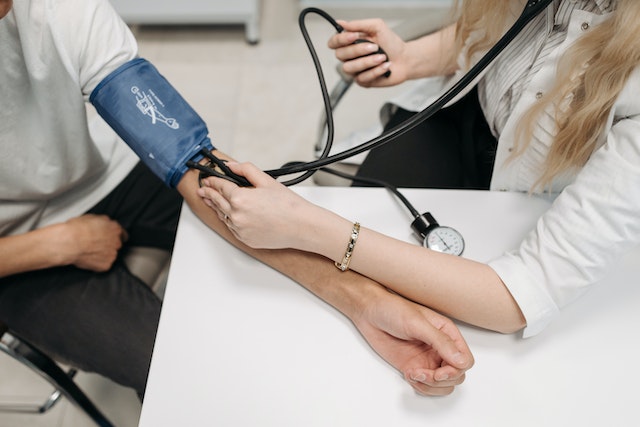Cardiovascular health is a vital aspect of overall health and wellbeing. The cardiovascular system, which includes the heart and blood vessels, is responsible for delivering oxygen and nutrients to the body’s tissues and organs while also removing waste products. A healthy cardiovascular system is essential for maintaining optimal health and preventing a range of chronic diseases. In this article, we will explore the importance of cardiovascular health and discuss how to take care of it.
Importance of Cardiovascular Health
Cardiovascular health is crucial because it affects every aspect of the body’s functioning. When the cardiovascular system is healthy, blood flows freely through the blood vessels, providing oxygen and nutrients to the body’s tissues and organs. However, when the cardiovascular system is compromised, it can lead to serious health problems such as heart disease, stroke, and high blood pressure.
Heart disease, also known as cardiovascular disease, is the leading cause of death worldwide. According to the World Health Organization, approximately 17.9 million people die each year from heart disease, accounting for 31% of all deaths globally. High blood pressure, high cholesterol, smoking, obesity, and a sedentary lifestyle are all risk factors for heart disease.
Stroke is another serious health problem associated with poor cardiovascular health. A stroke occurs when the blood flow to the brain is interrupted, leading to brain damage. According to the Centers for Disease Control and Prevention, stroke is the fifth leading cause of death in the United States, with someone dying of a stroke every four minutes.
High blood pressure is a common condition that affects many people worldwide. When the force of blood flowing through the blood vessels is too high, it can lead to damage to the blood vessels and organs such as the heart, brain, and kidneys. Over time, this can lead to serious health problems such as heart disease and stroke.
How to Take Care of Cardiovascular Health
Fortunately, there are many steps individuals can take to maintain good cardiovascular health. These include:
- Exercise regularly: Regular exercise is essential for maintaining good cardiovascular health. Exercise helps to strengthen the heart and blood vessels, improve blood flow, and reduce the risk of heart disease and stroke. It is recommended that adults engage in at least 150 minutes of moderate-intensity exercise or 75 minutes of vigorous-intensity exercise per week.
- Eat a healthy diet: A healthy diet is crucial for maintaining good cardiovascular health. A diet rich in fruits, vegetables, whole grains, lean protein, and healthy fats can help to lower blood pressure, reduce cholesterol levels, and improve overall heart health. It is important to limit the intake of saturated and trans fats, salt, and added sugars.
- Maintain a healthy weight: Being overweight or obese is a risk factor for heart disease and stroke. Maintaining a healthy weight through a healthy diet and regular exercise is essential for maintaining good cardiovascular health.
- Quit smoking: Smoking is a major risk factor for heart disease, stroke, and many other health problems. Quitting smoking can greatly improve cardiovascular health and reduce the risk of heart disease and stroke.
- Manage stress: Chronic stress can have a negative impact on cardiovascular health. Learning stress management techniques such as meditation, deep breathing, or yoga can help to reduce stress levels and improve cardiovascular health.
- Get enough sleep: Getting enough sleep is essential for maintaining good cardiovascular health. Lack of sleep can lead to high blood pressure, obesity, and other health problems. Adults should aim for 7-8 hours of sleep per night.
- Manage other health conditions: Other health conditions such as diabetes and high cholesterol can also increase the risk of heart disease and stroke. It is important to manage these conditions through medication, lifestyle changes, and regular medical check-ups.
Conclusion
Cardiovascular health is essential for maintaining overall health and wellbeing. A healthy cardiovascular system is crucial for delivering oxygen and nutrients to the body’s tissues and organs, while also removing waste products. Poor cardiovascular health can lead to serious health problems such as heart disease, stroke, and high blood pressure, which are major causes of death worldwide.
Fortunately, there are many steps individuals can take to maintain good cardiovascular health, including regular exercise, a healthy diet, maintaining a healthy weight, quitting smoking, managing stress, getting enough sleep, and managing other health conditions.
In addition to these steps, it is also important to recognize the early warning signs of heart disease and stroke. These can include chest pain or discomfort, shortness of breath, pain or numbness in the arms or legs, sudden confusion or trouble speaking, and sudden weakness or numbness on one side of the body. If you experience any of these symptoms, it is important to seek medical attention immediately.
Furthermore, it is essential to understand the importance of preventive care for cardiovascular health. Regular medical check-ups, including blood pressure and cholesterol screenings, can help to detect potential problems early on and prevent the development of serious health problems. It is also important to stay up-to-date with recommended vaccinations, such as the flu vaccine, which can help to prevent complications from respiratory infections that can put additional strain on the cardiovascular system.
Cardiovascular health is a vital aspect of overall health and wellbeing. With the right care and attention, it is possible to maintain good cardiovascular health and enjoy a long and healthy life.
Photo by Pavel Danilyuk
Cardiovascular
-

Natural Remedies for Arrhythmia: Tips for a Healthy Heart Rhythm
Arrhythmia is a condition that affects the heart’s rhythm and can lead to serious health problems. While medications and other medical interventions can be helpful in managing arrhythmia, there are also natural remedies that can support a healthy heart rhythm. In this article, we will explore some natural remedies for arrhythmia and tips for maintaining…
-

The Benefits of CoQ10 (Coenzyme Q10) for Heart Health
-

The Ultimate Guide For a Heart-Healthy Diet: A Comprehensive Approach
-

How to Lower Cholesterol Naturally: Tips and Remedies
-

The Top 10 Natural Remedies For High Blood Pressure (Hypertension)
-

Foods that Boost Heart Health: A Natural Approach
-

How Exercise Can Prevent Heart Disease









Leave a Reply